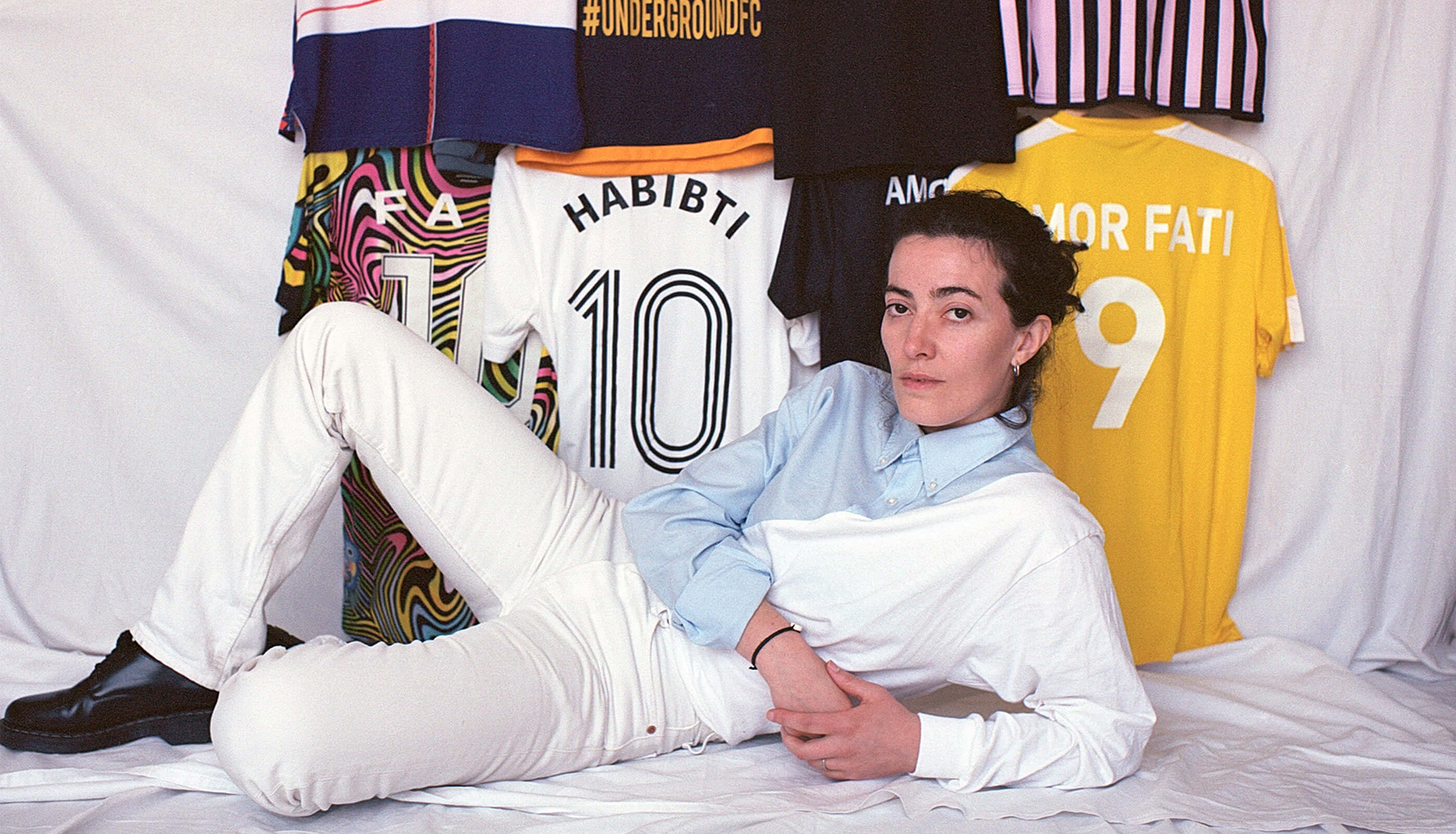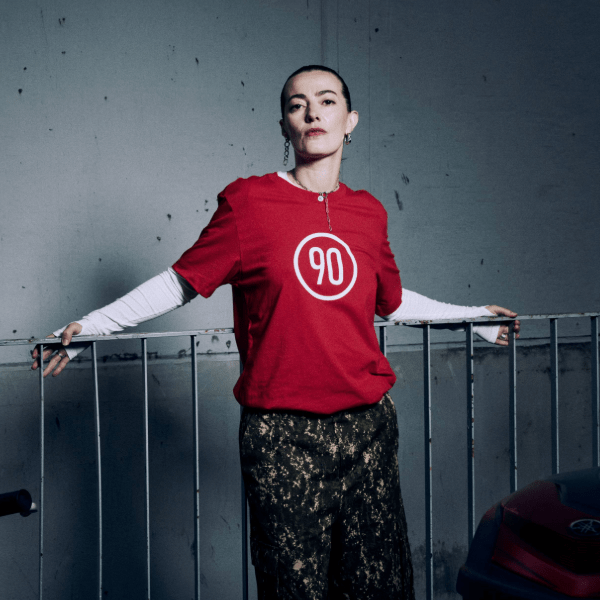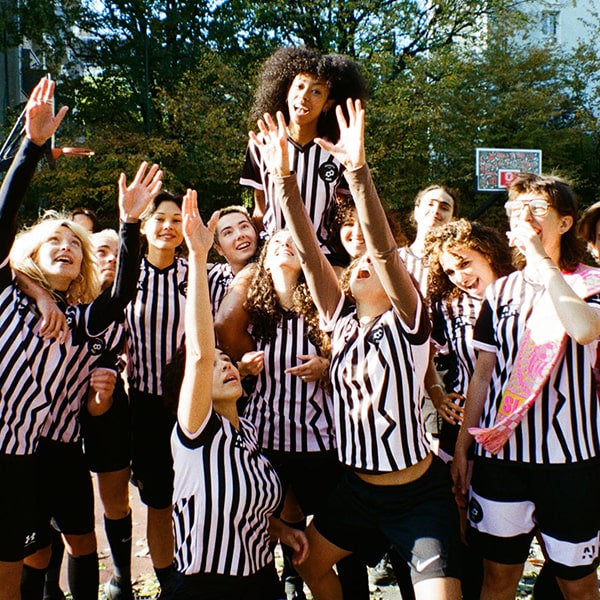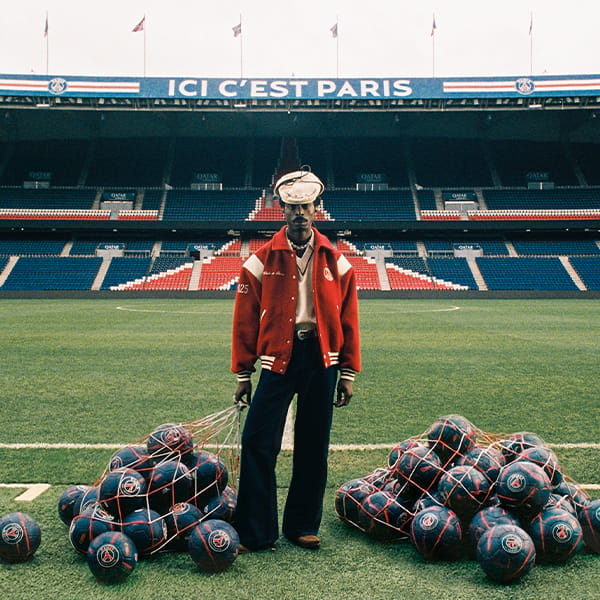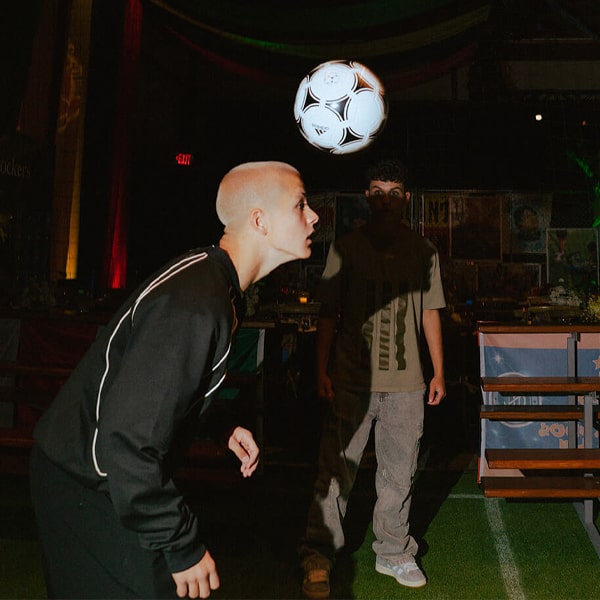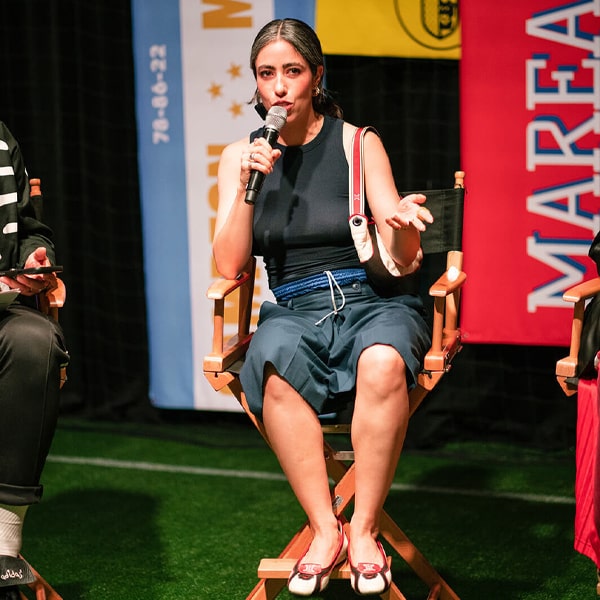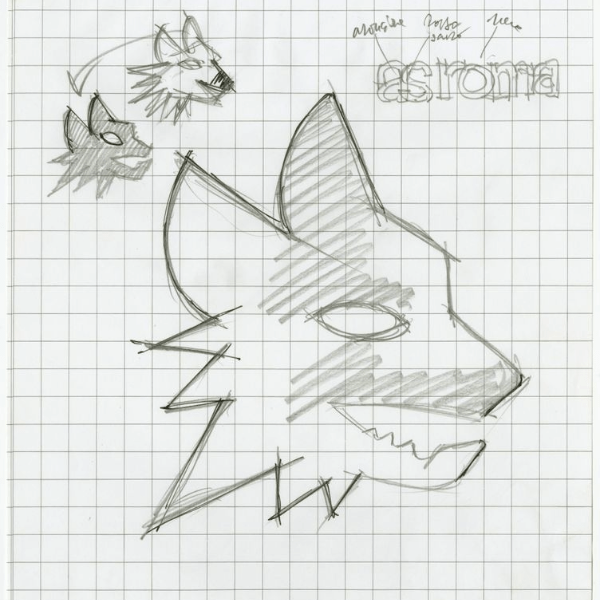The inclusive grassroots football team that the Algerian-born Parisian founded in 2012 has evolved into a disruptive creative collective that curates diverse events and releases unique merch.
SoccerBible Creative Soccer Community is our rolling directory of global talent with diverse passion points operating at the intersections of football and creativity. They are specialists and trailblazers in disciplines including art, photography, film, fashion, product design, music, and architecture who embody everything SoccerBible stands for. Discover them here and support their work.
Game recognises game so Red Star FC creative director David Bellion asked Cacahuètes Sluts founder and Red Star FC fan Fati Rouina to be in the club’s artistic 2024/2025 jersey campaign. What happens when two visionaries, both known for collaborating with emerging artists and directing campaigns, push boundaries far beyond their Sunday kickabouts with other Parisian creatives? Rouina is cleverly cast as French General Lafayette shaking hands with KidSuper (here American General George Washington) on a football pitch wearing Red Star FC’s Away jersey. Thanks to the photograph being sharply collaged with The First Meeting of Washington and Lafayette—Philadelphia, August 3rd, 1777 lithograph (1876, The Met) in the style of artist Davide Trabucco’s CONFORMI project. “I’ve known him for six years and he convinced me. It’s really nice and chill shooting with David,” shares Rouina over Teams. “Because Red Star have David, they have successful creative design and cool partnerships.”
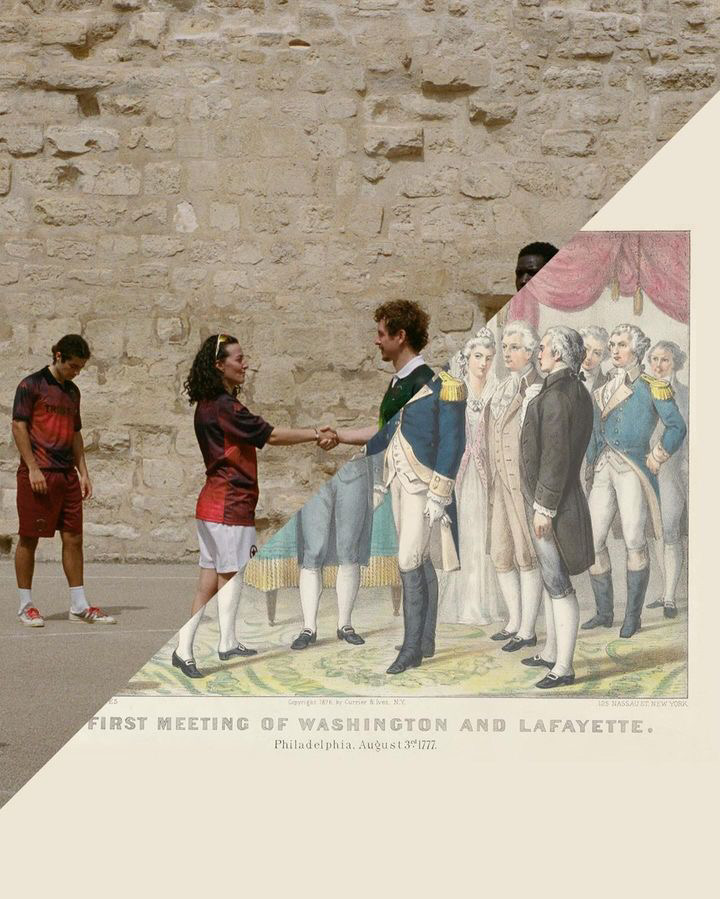
High praise from a discerning creative who also coaches football and has created bold kits and merch since starting her grassroots football team in 2012. The psychedelic swirl of the Cacahuètes Sluts x Le Ballon jersey (2016), designed by acclaimed shirt designer Jason “los dejos” Lee, is admirable but the “Fierce” kit (2020) emblazoned with one of artist Iris Marchand’s female nudes truly captured hearts and opened wallets (including my own). Besides hosting city stade sessions and tournaments that ensure women and non-binary people visibly play football locally, Cacahuètes Sluts’ international linkups are legendary. “We recently organised a special SISTERHOOD game to welcome the London team Romance FC to Paris,” Rouina recalls. “They spent the weekend with us and we celebrated eight years of friendship and their 12 years of existence. I love sharing these precious moments.”
To say Rouina is inspirational is true but she’d describe herself as an ‘activist’ and ‘political’. Against the backdrop of the French Football Federation’s hijab ban, she proactively fights for causes she believes in unapologetically: widening representation and creating inclusive football spaces for women and marginalised communities. Even though the 2024 Olympics all but paused Rouina’s football efforts, and allowed her to holiday in the South of France, Cacahuètes Sluts’ presence was felt in the art piece COMMUNITY they created for the Vernissage exhibition Triathlon de la Mode Éthique. “We used football equipment and Puma’s rainbow football to make it and represent activism and the queer community,” she explains. Teaming up with the ARTISTS AGAINST APARTHEID movement to demand a total, immediate, and permanent ceasefire in Palestine via a solidarity fundraising evening “Queers 4 Palestine” in June is proof that IRL events with a big social media reach are probably the most powerful weapon in the Parisian's arsenal.
Here, Rouina talks SoccerBible through her unusual trajectory, incredible progress, and why old-school hip-hop inspires her.
Can you tell us a bit about yourself?
Fati Rouina: “My name and my grandmother's name is Fatima but everyone calls me Fati. I was born in Dellys, Algeria, and moved to the Paris suburbs when I was seven. I am a non-practicing Muslim but I cultivate my religion through books, music, stories my mother tells me, by doing Ramadan, celebrating Eid Al-Fitr, and I don’t eat pork.
“I created the grassroots football team Cacahuètes Sluts around 12 years ago because I wanted to be more represented in football – as Arab, as a lesbian, as someone who loves fashion and is also interested in music, culture, and skateboarding. In the last two years, it's become a community collective that makes cultural and artistic events around football.”
How did you get into football?
Fati Rouina: “Football was my soul and way of expressing myself. I started playing football at four and used it to integrate into France. I only played with boys until I was 13.”
Who’s your favourite football player?
Fati Rouina: “I’m a midfielder like Zinedine Zidane who is still my favourite. I know it’s controversial but I also love Cristiano Ronaldo.”
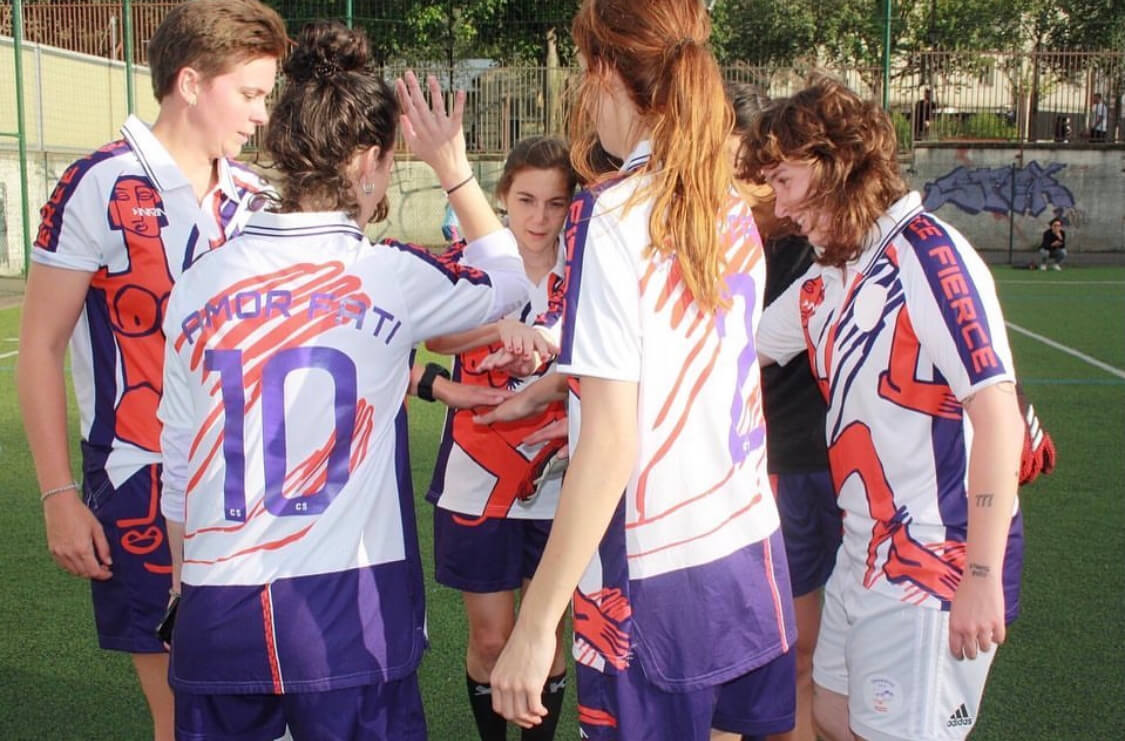
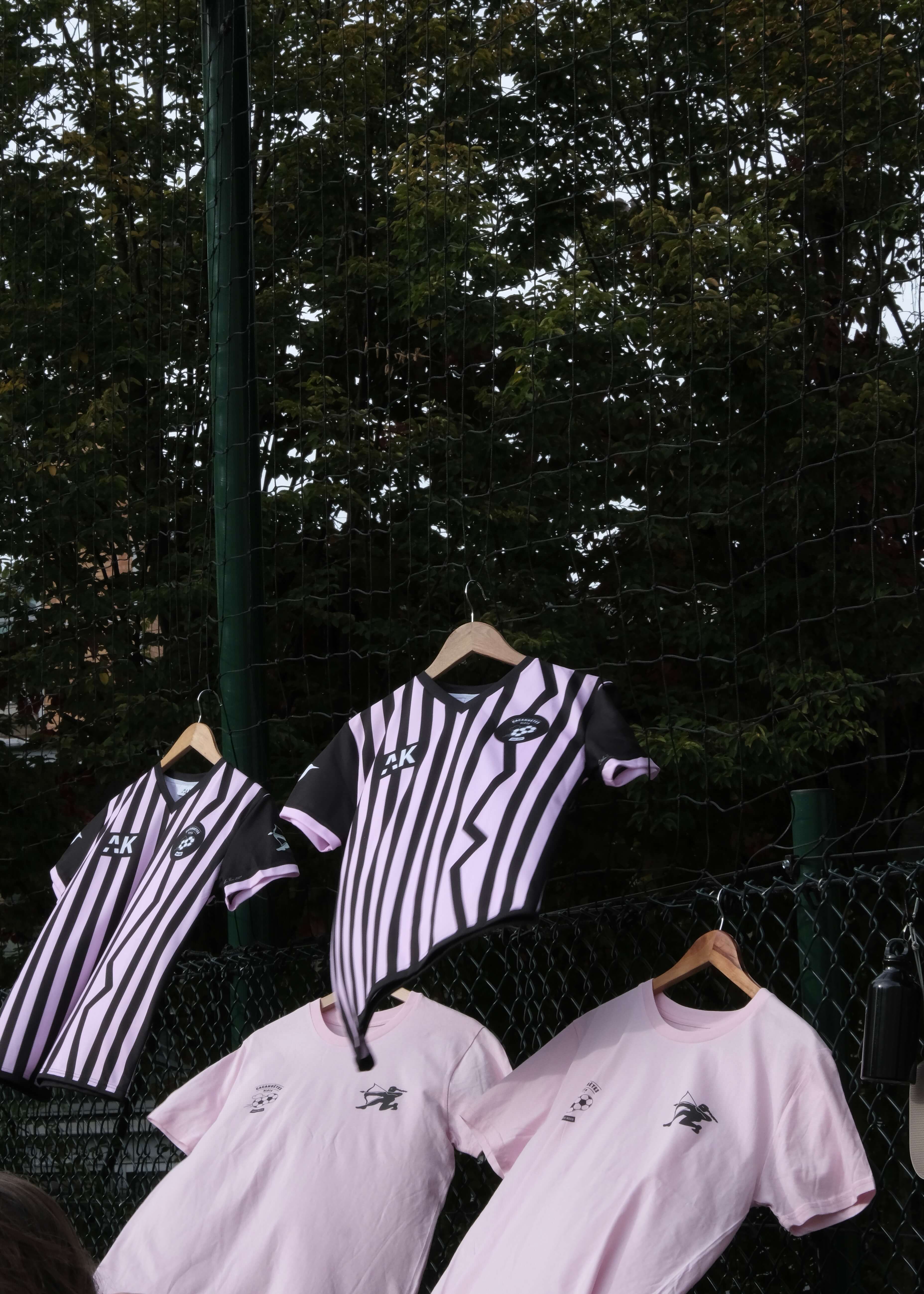
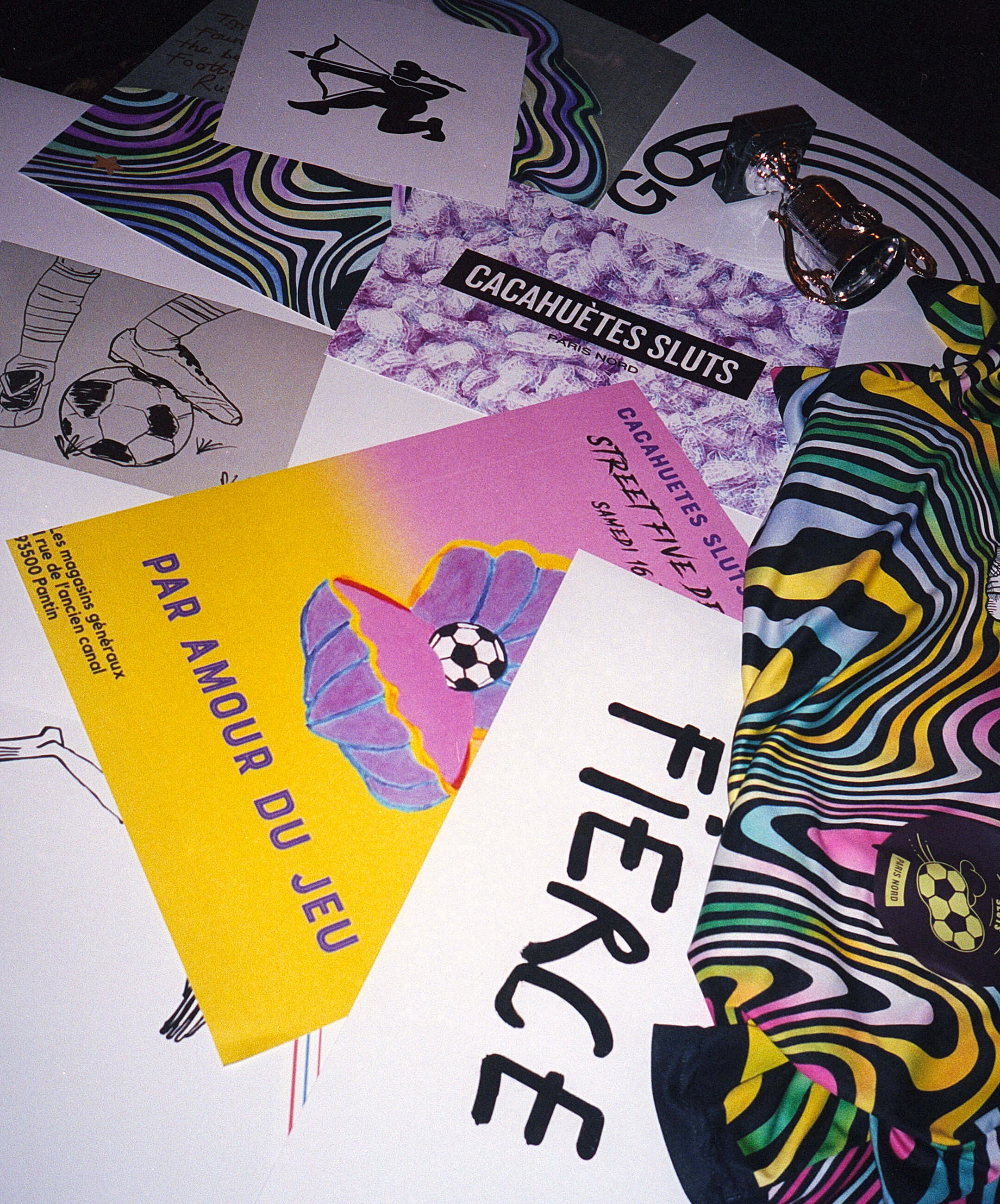
What’s your 9-to-5?
Fati Rouina: “I’ve been consulting for brands like Nike and adidas for almost two years – most recently UEFA for the Women’s Champions League Final in Bilbao. My day job before that wasn't linked to sports. I worked as a marketing and sales director for two dating apps then I was a talent manager finding queer influencers globally. I stopped all this because football and my activism became more important than money.”
Any invaluable takeaways from your education?
Fati Rouina: “The ability to present my projects. I studied at Novancia Business School in Paris where I learned negotiation techniques and specialised in e-marketing, management, and entrepreneurship. My final thesis focused on why online media must diversify.”
Who/what inspires you? Break down your creative process.
Fati Rouina: “Music, an exhibition, the sequence in a movie. For example, If I want a new kit, I listen to music, and it gives me something emotional, I start thinking the kit will be called ‘Sentimental’. Then I make a mood board with the colour(s) and form I want. The more I progress on the mood board, the more I know which artists to collaborate with and I prioritise women and queer artists – the last pink and black kit was made with Pablo Grand Mourcel. The mood board and/or the creative direction always come from me.”
Describe your creative signatures.
Fati Rouina: “Every piece has a name because every piece has a story – the ‘Fierce’ kit, the ‘Arrow kit’, even scarves like ‘Fem’ and ‘Butch’. I have signatures with my jerseys on the pitch: my number is 10 and the name on the back is ‘Amore Fati’. ‘Amore’ means love and ‘Fati’ means destiny so it’s ‘love your destiny’.”
How do you feel you’re pushing Creative Soccer Culture forward in Paris?
Fati Rouina: “We have photographers, designers, artists and lots of creatives at Cacahuètes Sluts so it was natural for us to bring ideas and transform into something more than just an amateur women’s football team. When we created the brand around Cacahuètes Sluts and launched it on Instagram, people started to follow us.
“I started to talk about inclusivity early on, first women, then non-binary people, then queer and trans people who play football. I imagine events around football culture to show that our culture is beautiful and deserves to be in the spotlight. It really grew and now we inspire teams, artists, and brands. I'm very proud of this.”
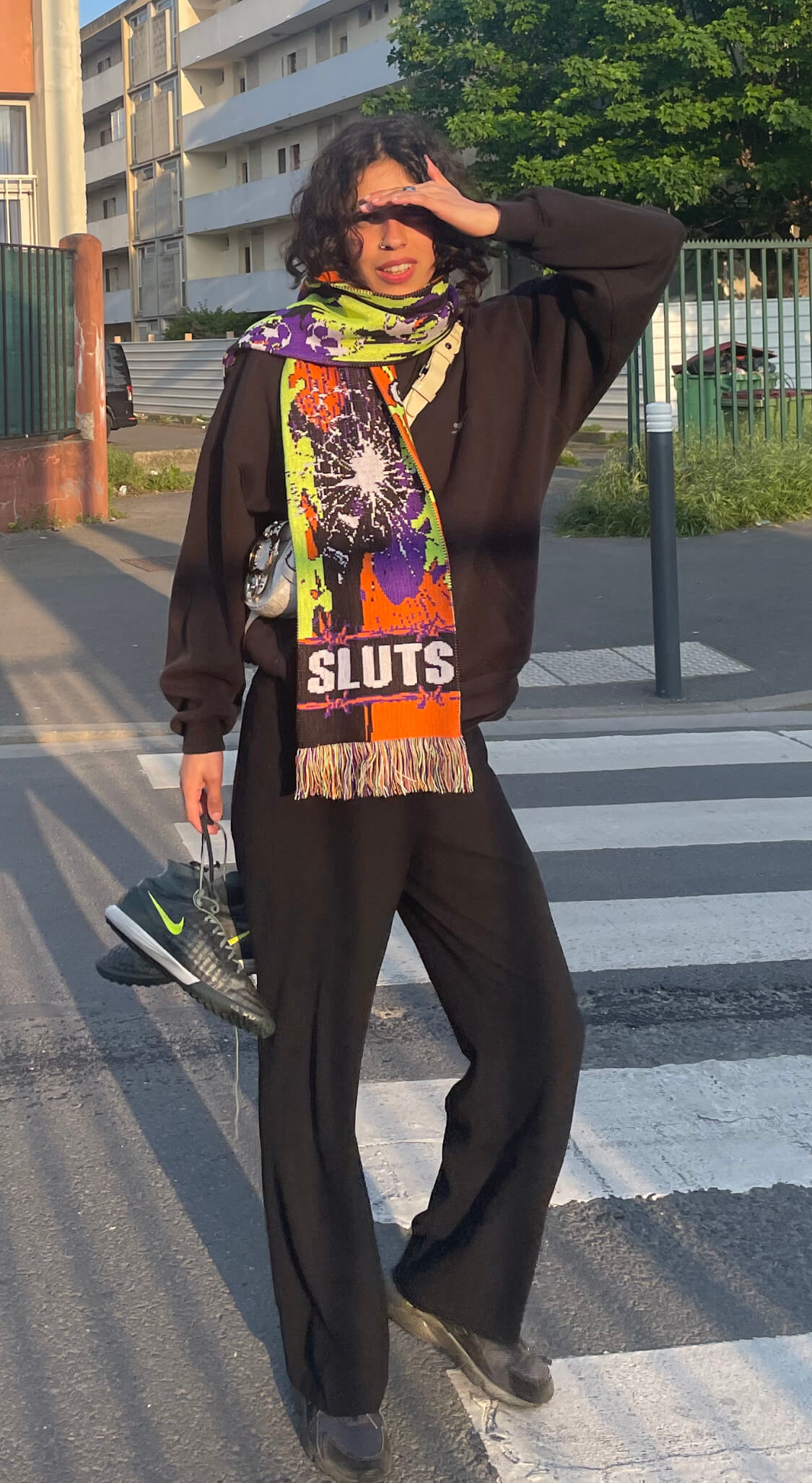
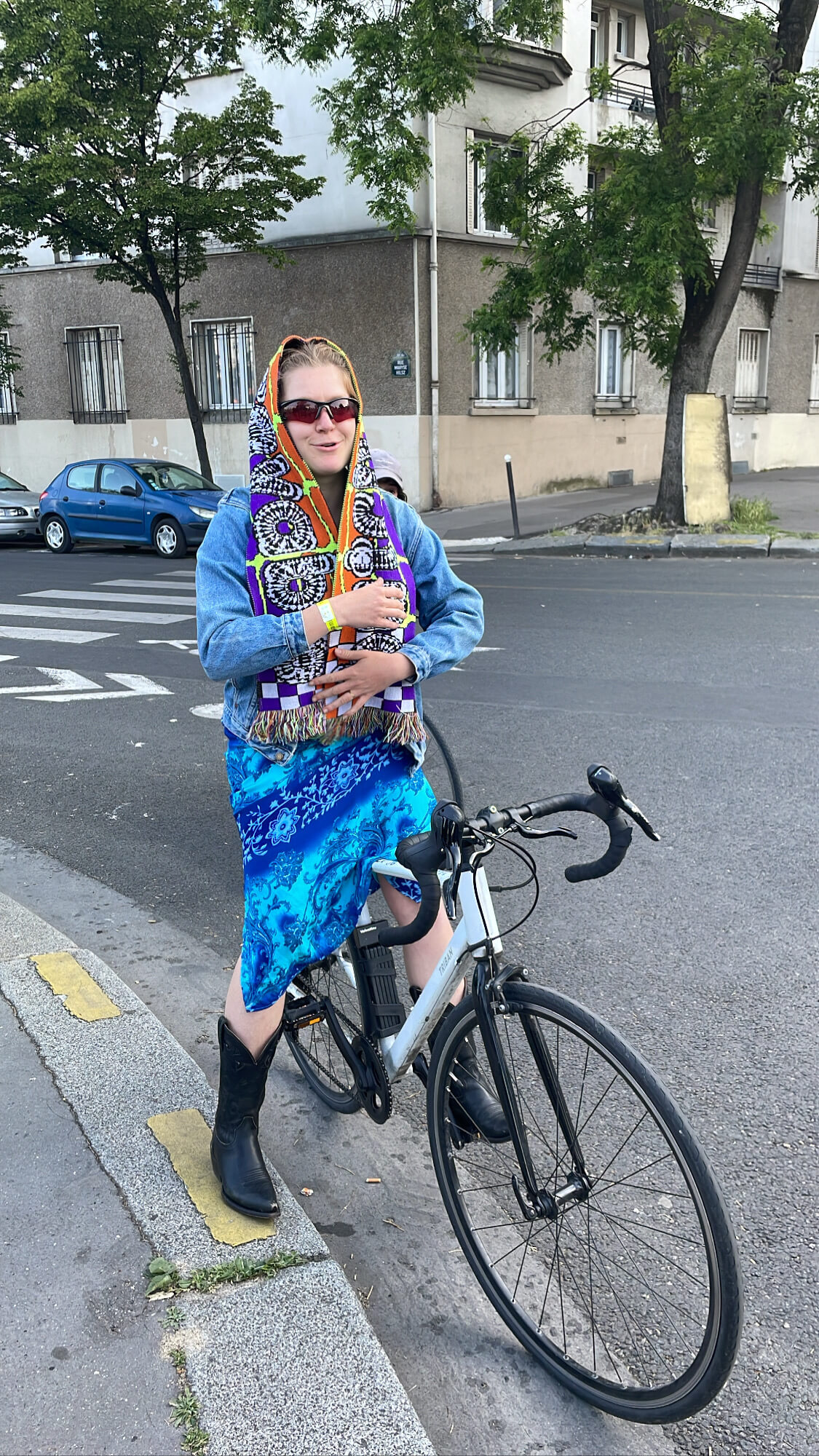
What’s the biggest creative risk you’ve taken?
Fati Rouina: “The ‘Butch’ scarf (2023). It's very specific and in queer communities, ‘Butch’ is used to describe lesbians who are more masculine. I was afraid it would be a flop but this scarf was bought in 28 countries. it would have been impossible to do it with a brand. Anecdotally, butch lesbians were so happy and felt represented by having this scarf in a football space.”
The standout Cacahuètes Sluts moment/project is…
Fati: “Queers 4 Palestine (2024). The fundraising event brought together everything I love: creativity, fashion culture, value, and engagement. It's not easy to talk about people who are dying. I wanted to use football to create an exhibition about different teams supporting Palestine using movies and cinema culture from different countries. Freedom Fields directed by Naziha Arebi, Balls, Barriers and Bulldozers directed by Harriet Hoare, A letter to myself directed by Omar Gabriel, and Sultana's Reign directed by Hadi Moussally featured. It was a big success and well shared internationally.”
How do you unwind?
Fati Rouina: “I am an action woman. When I start to play soccer, everything leaves my mind and it's magical for my mental health. Every day I try to take 10 minutes to be with myself, do nothing, listen to my heart, and breathe for a calm moment. I generally go to the cinema alone one morning a week to stop my mind and focus on the movie.”
What was the last book you read?
Fati Rouina: “Girls Power: 150 ans de football féminin by journalist Hubert Artus. The book relates the history of women’s football from its birth in England at the end of the 19th century to its development from the 1960s.”
Which songs are in your current rotation and why?
Fati Rouina: “Sonique Sky gives me good vibrations. Luniz I Got 5 On It because I've been super inspired by old-school hip-hop music since I was a kid, and I continue to use the flow of street art for my creative direction. Alexi Shell The Spell (Club Edit) before a match because I love listening to ambient techno music for energy. Khaled Oran Marseille is a classic song that every Algerian has on their playlist. Oum Kalthoum Alf Leila wa Leila can last up to two hours and I often listen to it to recharge my batteries. My mother's favourite Egyptian singer gives me inspiring positive nostalgia.”
How many football shirts do you have?
Fati Rouina: “I have around 50 kits including classic jerseys from Brazil, Argentina, France, Arsenal, Manchester United, Marseille, and Juventus. I will never part with the Algeria 2021-2022 Home jersey.”
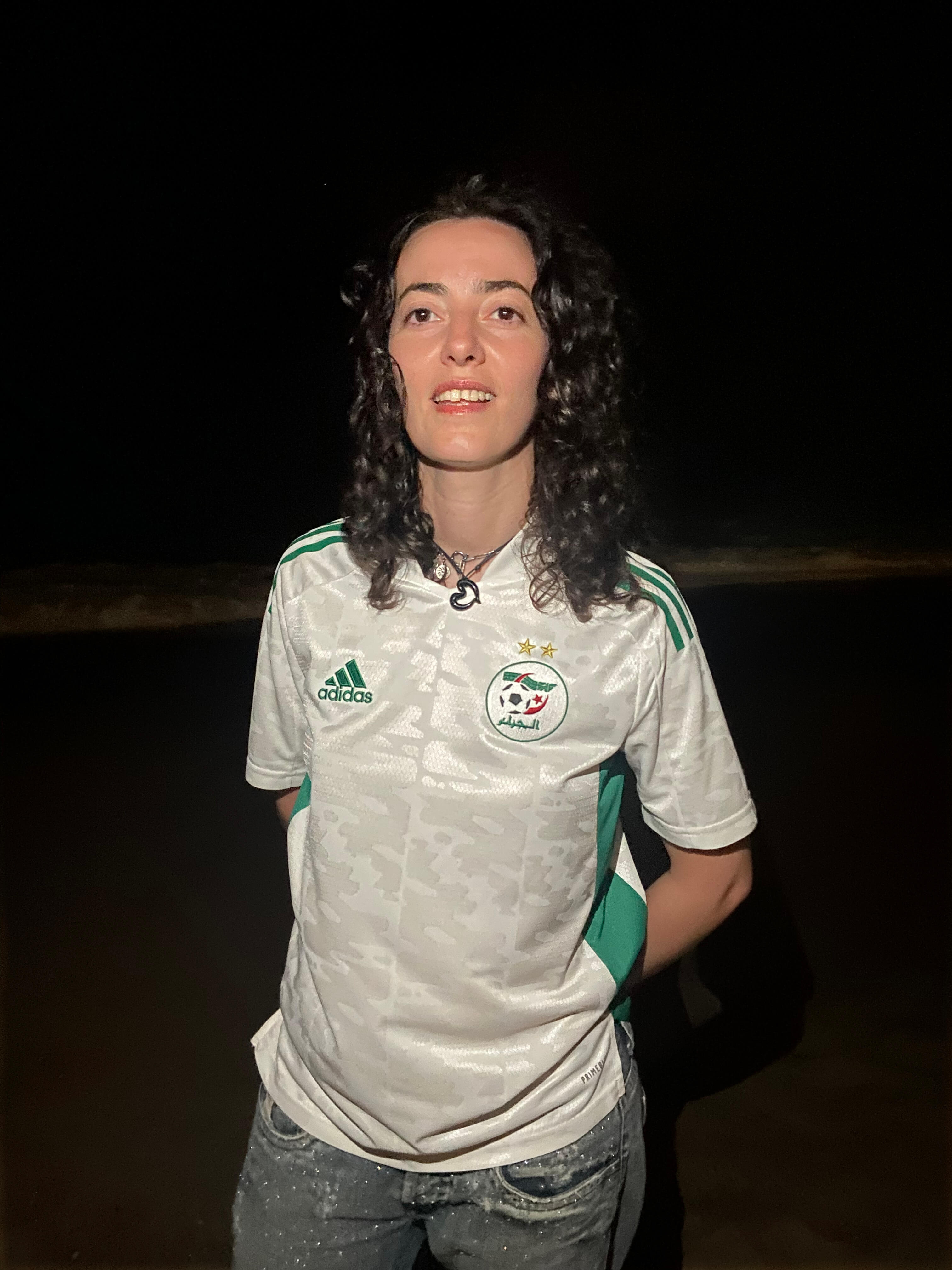
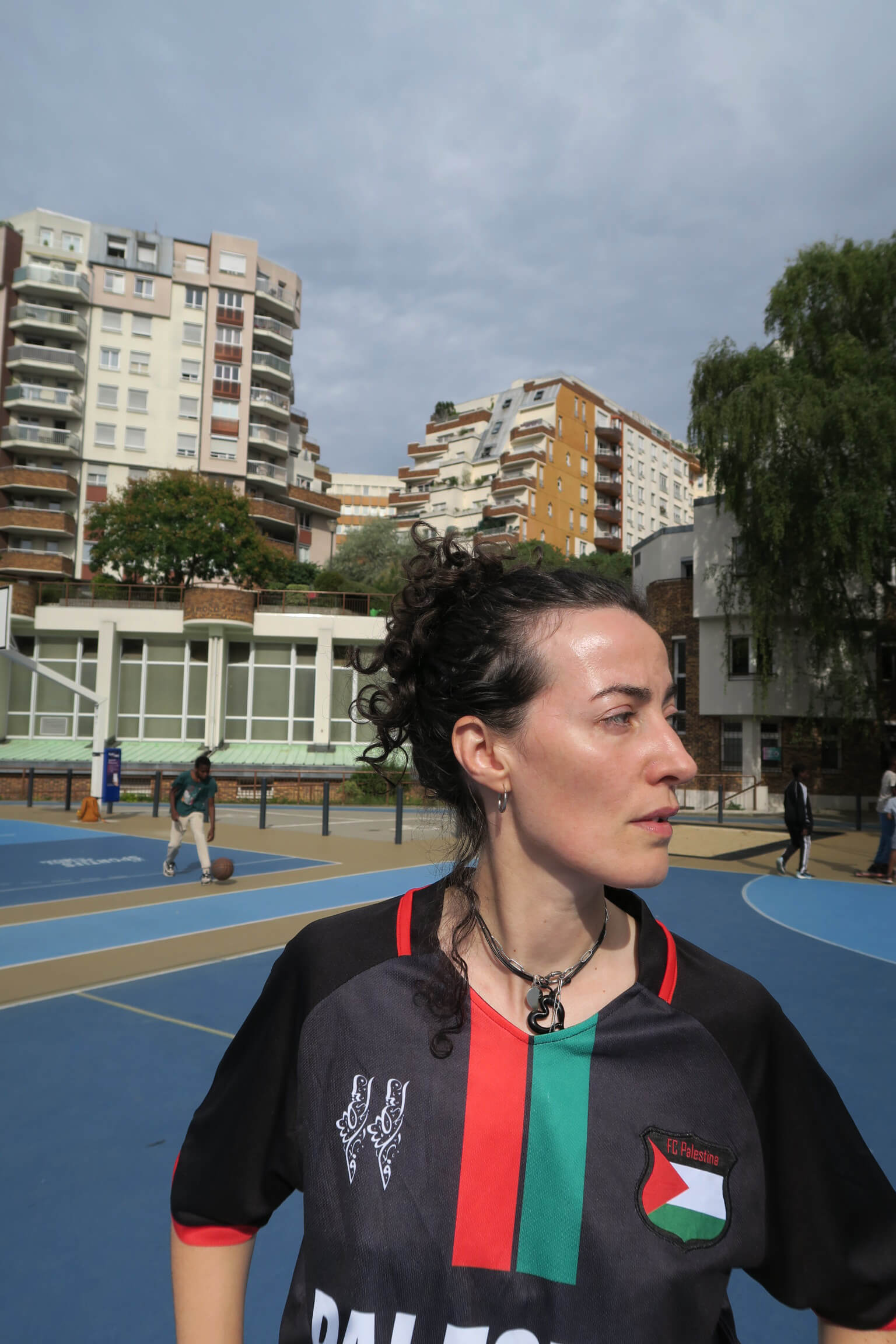
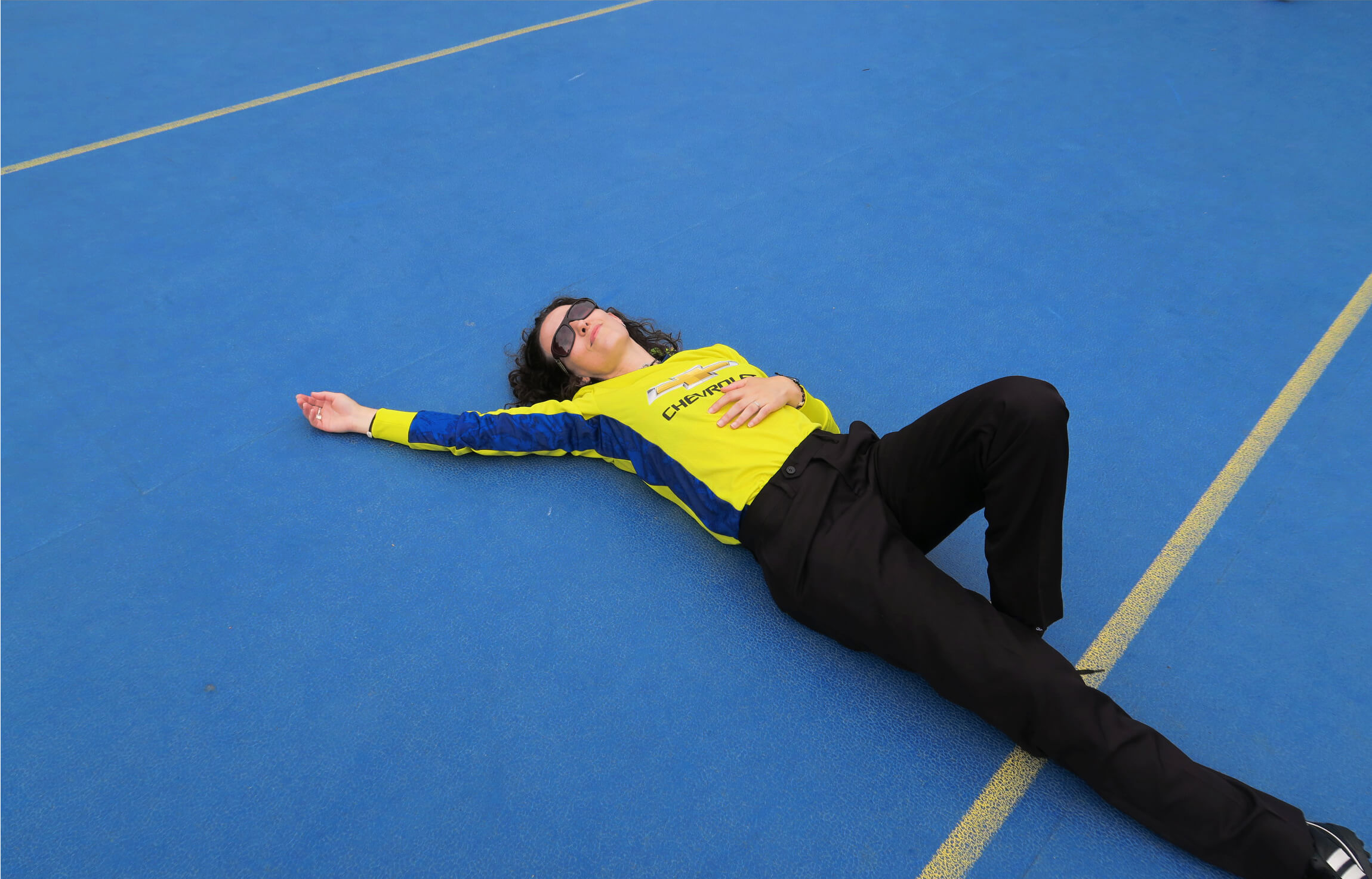
Any upcoming projects we should know about?
Fati Rouina: “I'm always doing something for my team, the community, or in collaboration with someone. I'm working on the next football exhibition in December, an open call to the photographers in our community to create an archive of football photography focused on five subjects: Fans, Revolution, Queer Community, Fashion, and Identity. I’m also starting to think about the next Cacahuètes Sluts kit. I know I really want to introduce more of my Arab origin and represent my ethnicity on the kit.”
What changes would you like to see in football) going forward?
Fati Rouina: “I want to see more space for queer, Black and Arab people in France, and greater equality on and off the field. I want to inspire women and girls to continue breaking barriers and changing stereotypical perceptions of female athletes. I hope to see more initiatives led by people of colour and queer people because their creativity is unique and special, and they have a lot to say and to create.”
Name some football creatives who should be on our radar.
Fati Rouina: “I love artist Emmanuel Mousset’s creativity, Chloé Wary, and queer artist Roxanne Maillet. I’m also an Emile Samory-Fofana superfan so I hope we can collaborate.”
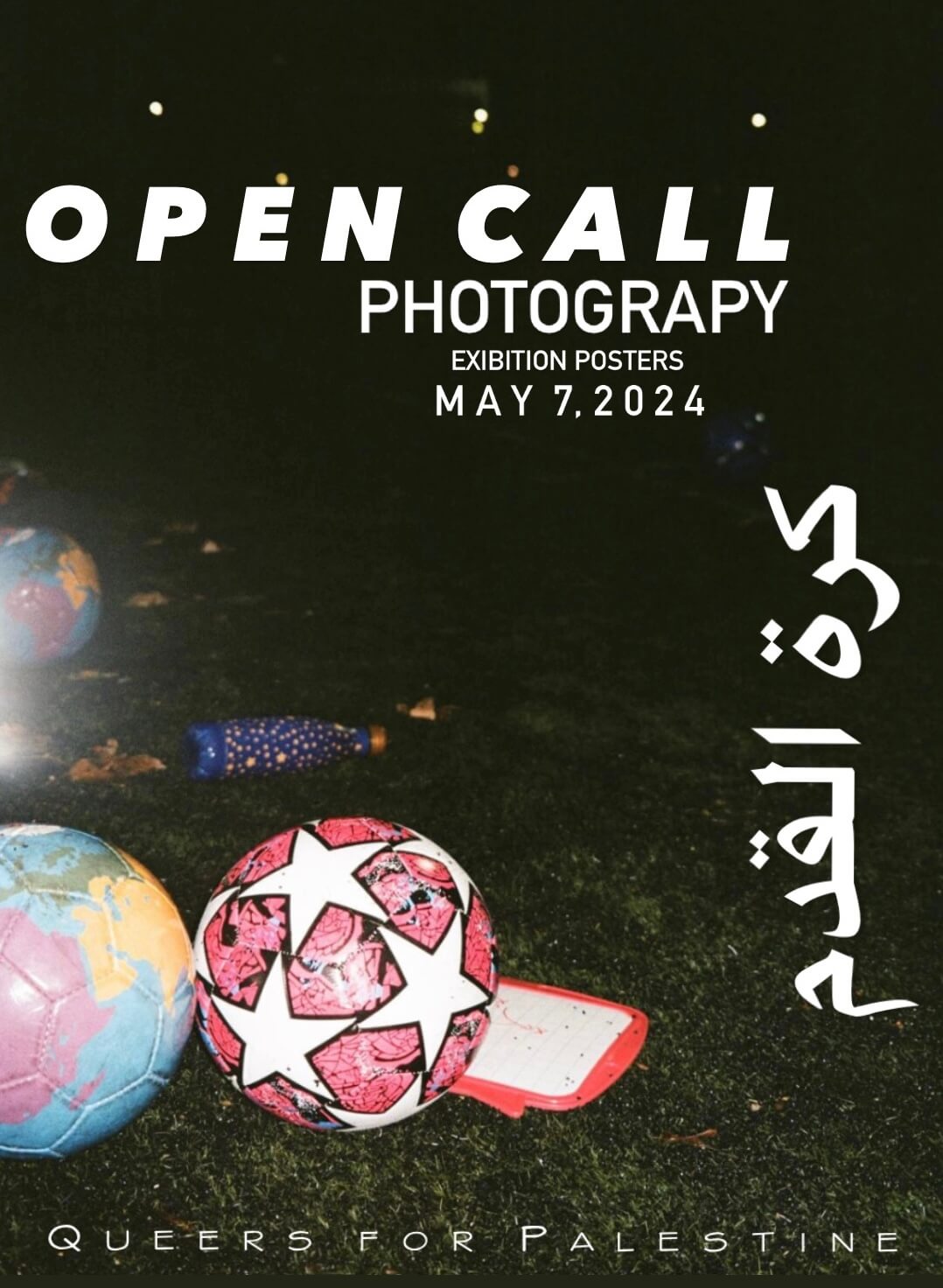
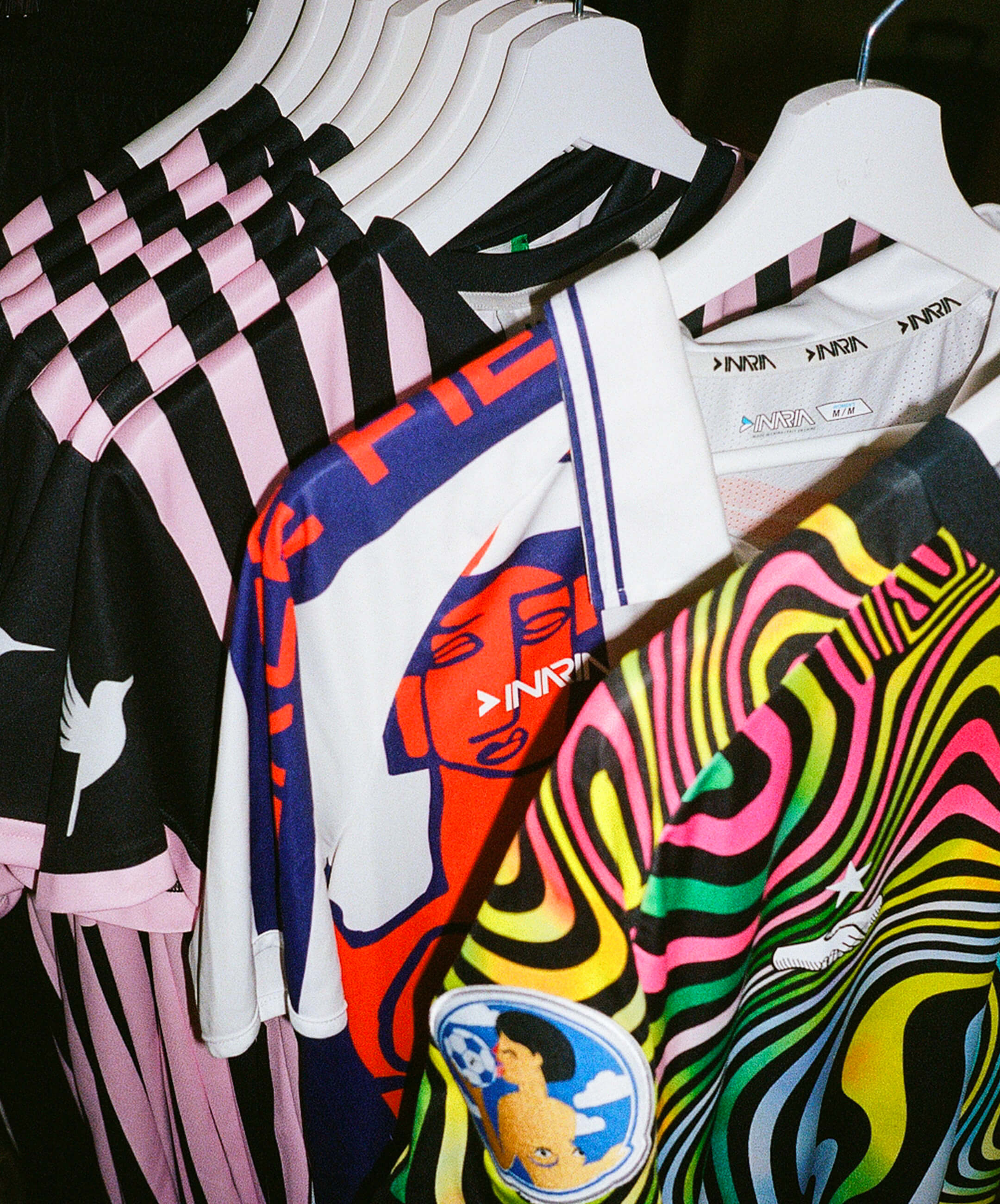
Images courtesy of Fati Rouina
Photography Lucy Cully and Emma Bert Lazli
